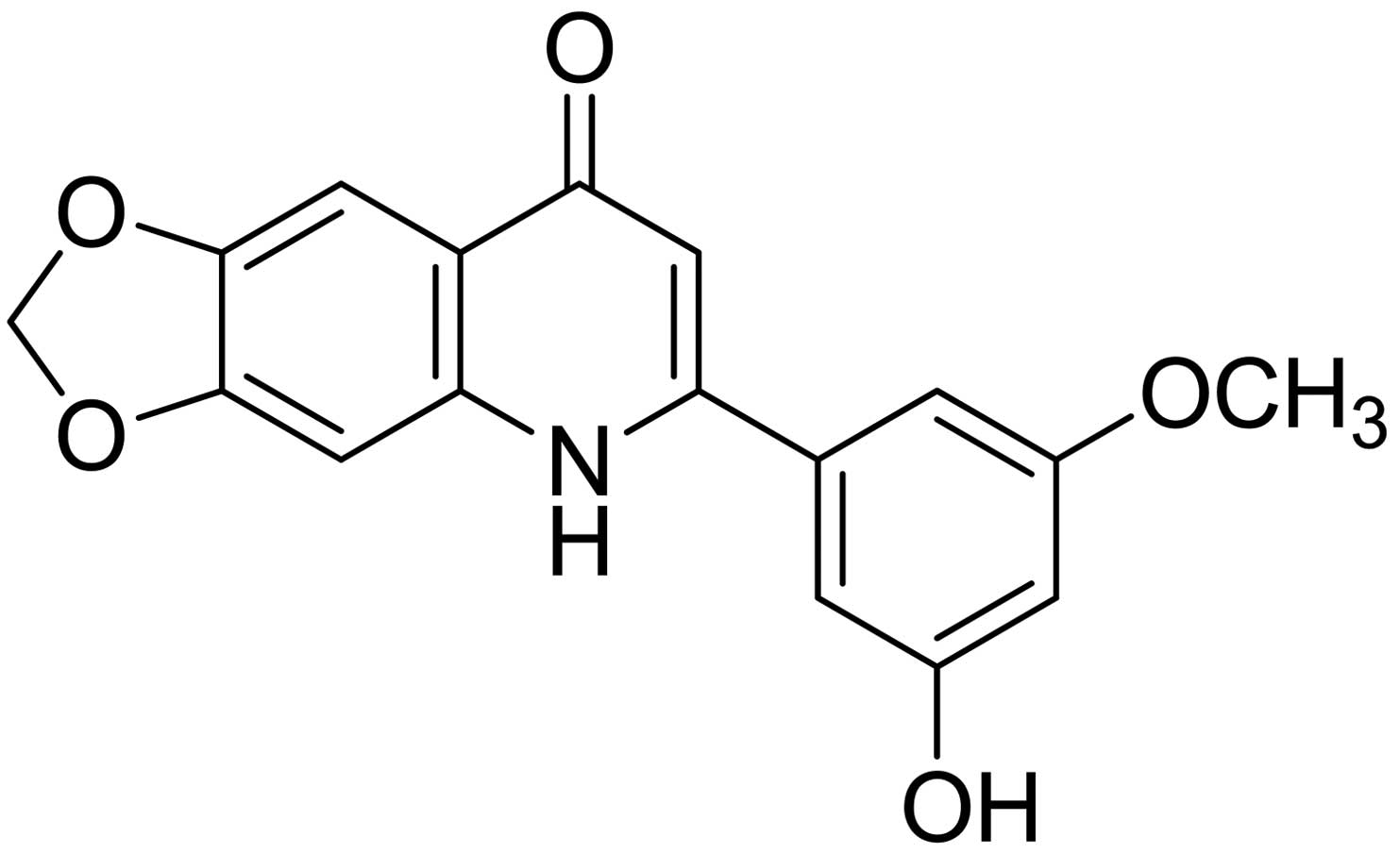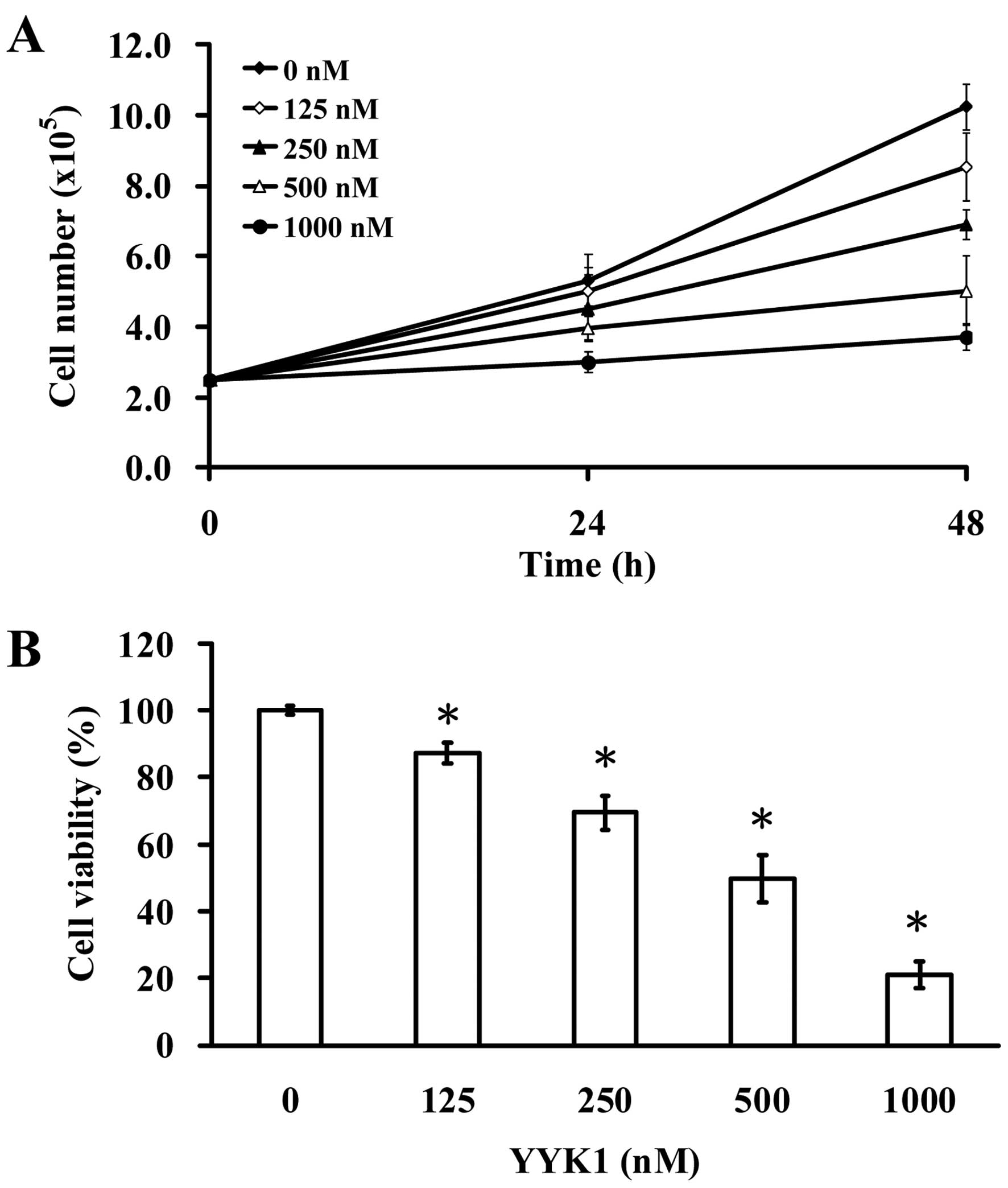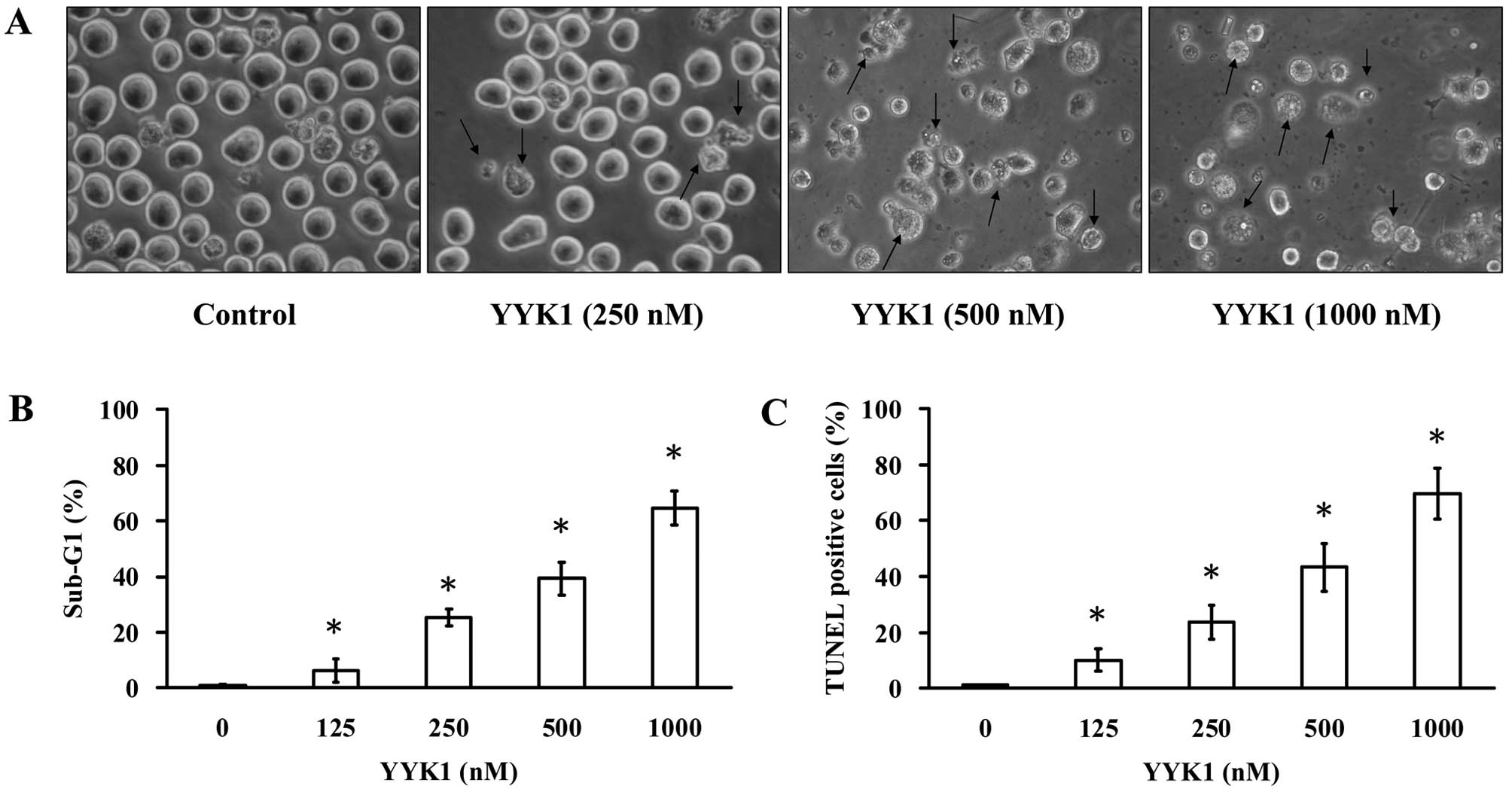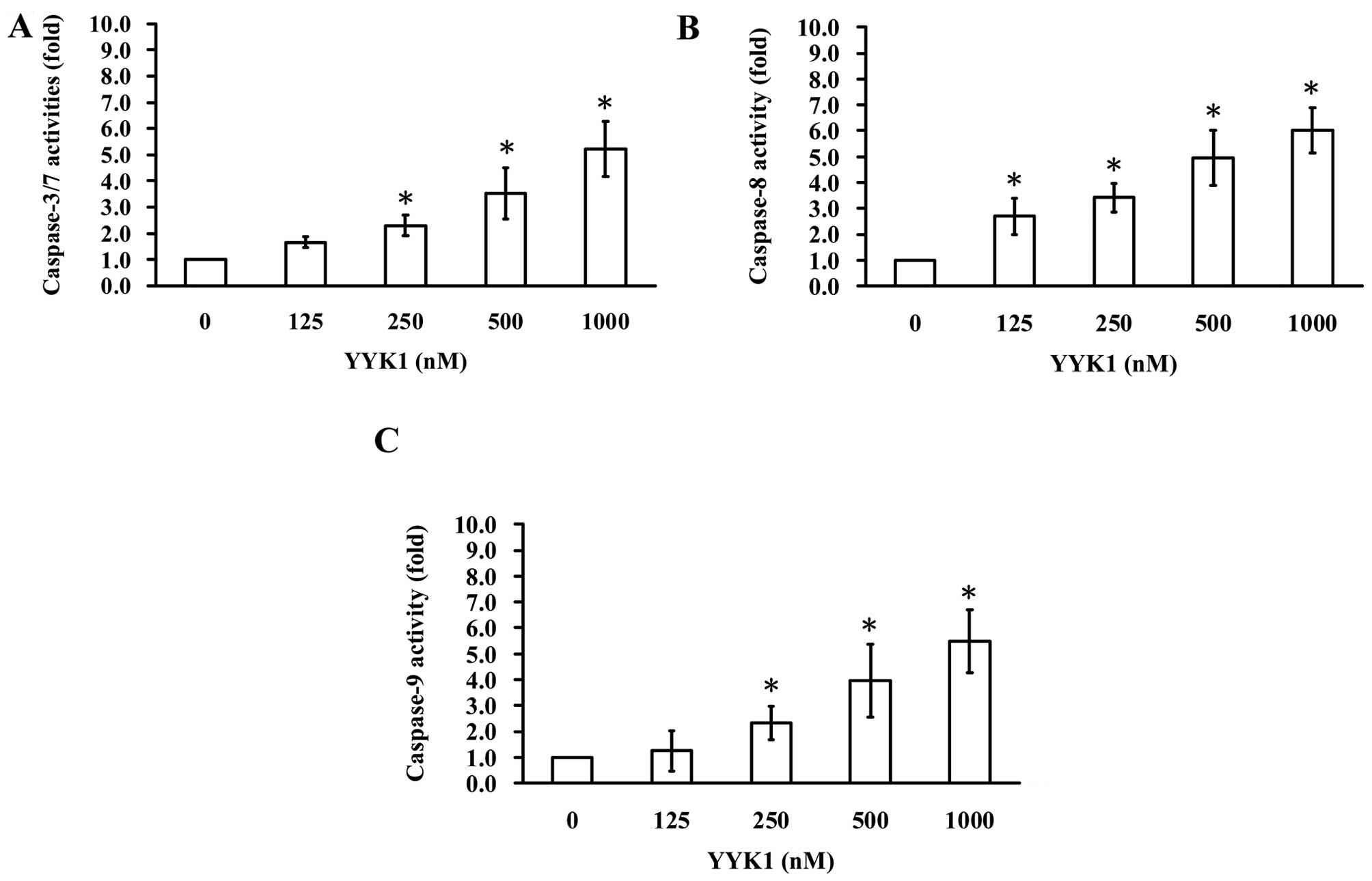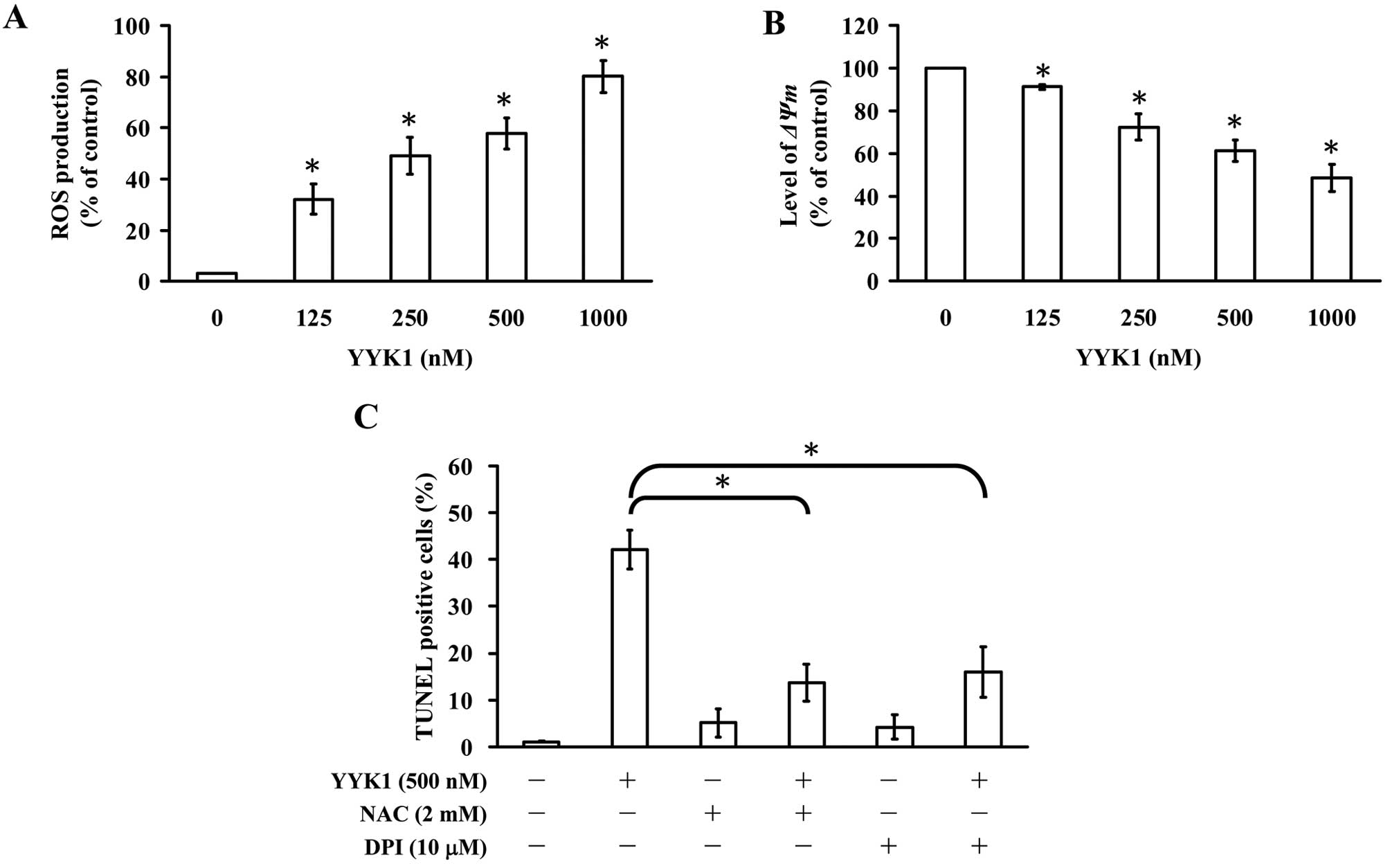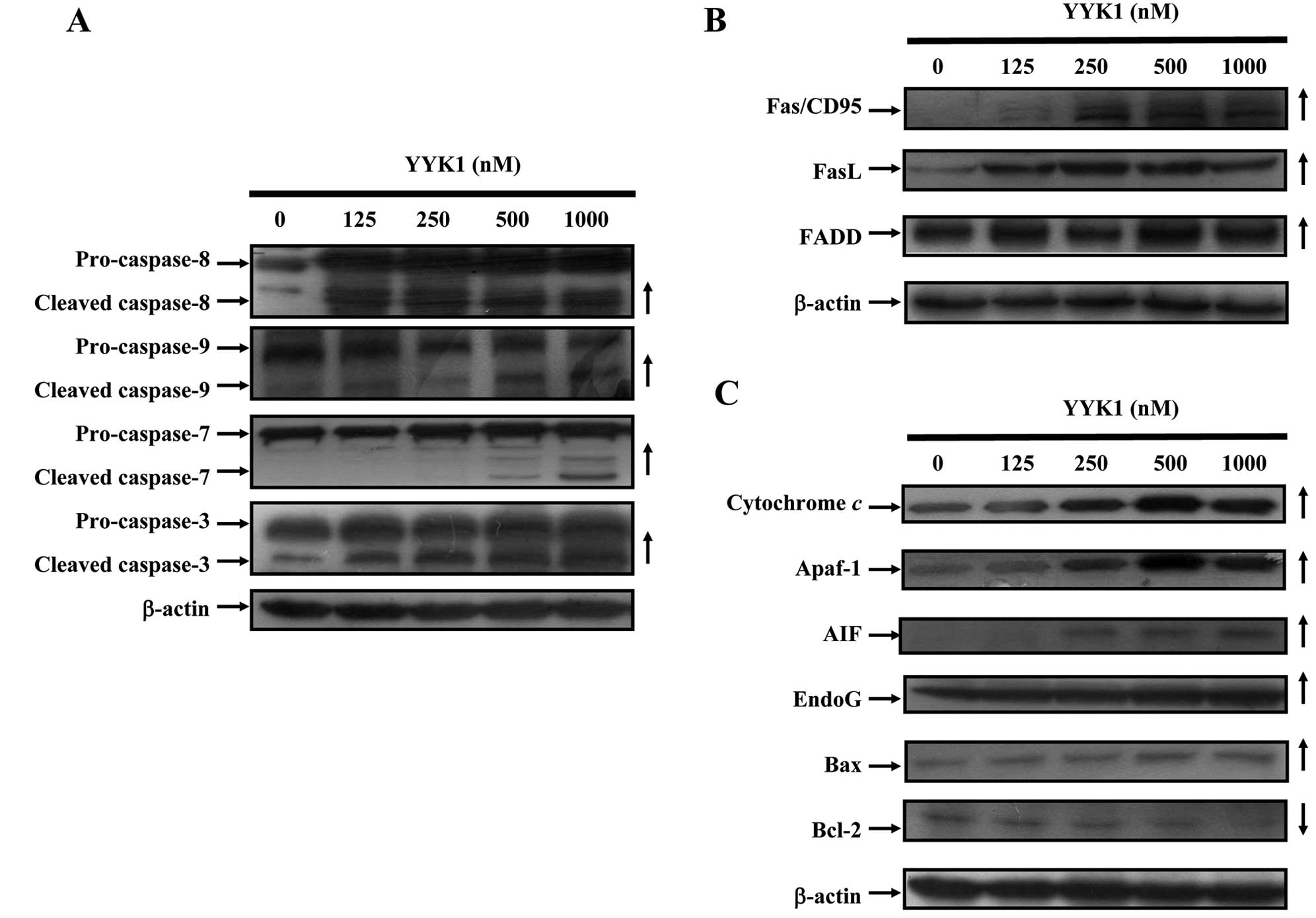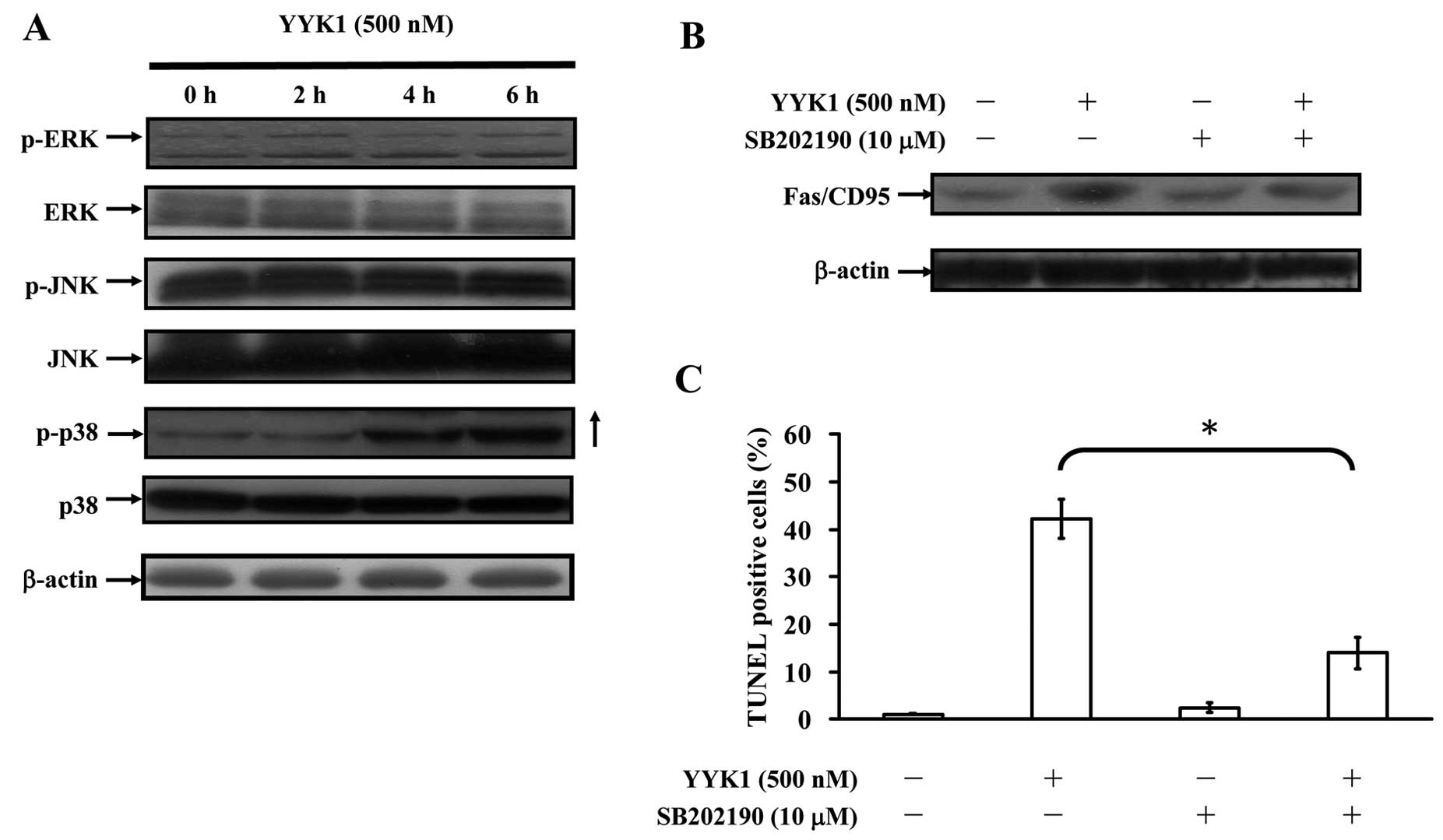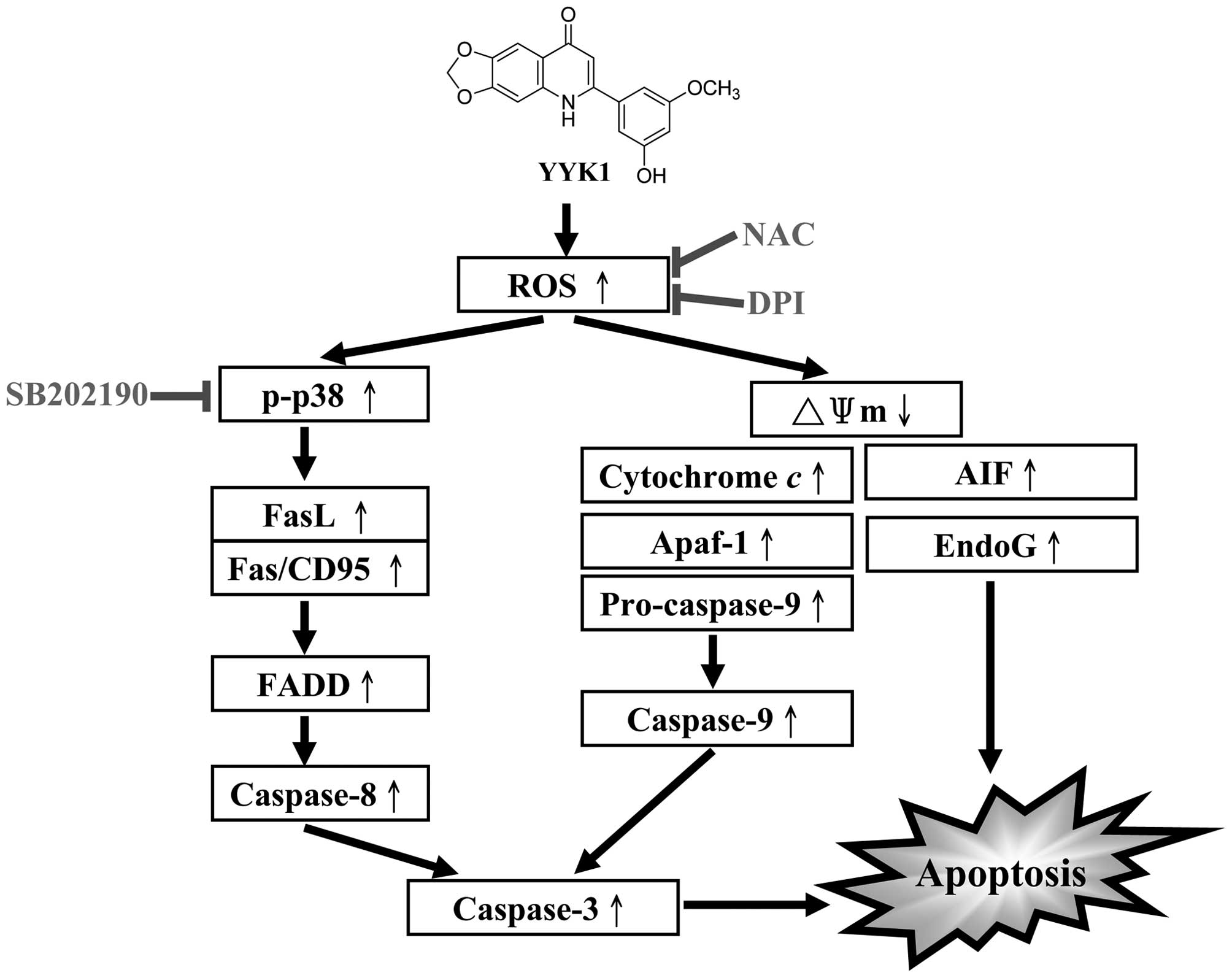|
1
|
Chung JG, Yang JS, Huang LJ, et al:
Proteomic approach to studying the cytotoxicity of YC-1 on U937
leukemia cells and antileukemia activity in orthotopic model of
leukemia mice. Proteomics. 7:3305–3317. 2007. View Article : Google Scholar : PubMed/NCBI
|
|
2
|
Sanjiv K, Su TL, Suman S, et al: The novel
DNA alkylating agent BO-1090 suppresses the growth of human oral
cavity cancer in xenografted and orthotopic mouse models. Int J
Cancer. 130:1440–1450. 2012. View Article : Google Scholar : PubMed/NCBI
|
|
3
|
Huang SM, Yang JS, Tsai SC, et al: The
novel synthesized
2-(3-(methylamino)phenyl)-6-(pyrrolidin-1-yl)quinolin-4-one (Smh-3)
compound induces G2/M phase arrest and mitochondrial-dependent
apoptotic cell death through inhibition of CDK1 and AKT activity in
HL-60 human leukemia cells. Int J Oncol. 38:1357–1364. 2011.
View Article : Google Scholar
|
|
4
|
Lavrik IN, Golks A and Krammer PH:
Caspases: pharmacological manipulation of cell death. J Clin
Invest. 115:2665–2672. 2005. View
Article : Google Scholar : PubMed/NCBI
|
|
5
|
Orrenius S: Reactive oxygen species in
mitochondria-mediated cell death. Drug Metab Rev. 39:443–455. 2007.
View Article : Google Scholar : PubMed/NCBI
|
|
6
|
Lombard C, Nagarkatti M and Nagarkatti PS:
Targeting cannabinoid receptors to treat leukemia: role of
cross-talk between extrinsic and intrinsic pathways in
Delta9-tetrahydrocannabinol (THC)-induced apoptosis of Jurkat
cells. Leuk Res. 29:915–922. 2005. View Article : Google Scholar : PubMed/NCBI
|
|
7
|
Ortiz MA, Lopez-Hernandez FJ, Bayon Y,
Pfahl M and Piedrafita FJ: Retinoid-related molecules induce
cytochrome c release and apoptosis through activation of c-Jun
NH(2)-terminal kinase/p38 mitogen-activated protein kinases. Cancer
Res. 61:8504–8512. 2001.
|
|
8
|
Chuang SM, Wang IC and Yang JL: Roles of
JNK, p38 and ERK mitogen-activated protein kinases in the growth
inhibition and apoptosis induced by cadmium. Carcinogenesis.
21:1423–1432. 2000. View Article : Google Scholar : PubMed/NCBI
|
|
9
|
Kim EK and Choi EJ: Pathological roles of
MAPK signaling pathways in human diseases. Biochim Biophys Acta.
1802:396–405. 2010. View Article : Google Scholar : PubMed/NCBI
|
|
10
|
Wagner EF and Nebreda AR: Signal
integration by JNK and p38 MAPK pathways in cancer development. Nat
Rev Cancer. 9:537–549. 2009. View
Article : Google Scholar : PubMed/NCBI
|
|
11
|
Roux PP and Blenis J: ERK and p38
MAPK-activated protein kinases: a family of protein kinases with
diverse biological functions. Microbiol Mol Biol Rev. 68:320–344.
2004. View Article : Google Scholar : PubMed/NCBI
|
|
12
|
Kyriakis JM and Avruch J: Mammalian
mitogen-activated protein kinase signal transduction pathways
activated by stress and inflammation. Physiol Rev. 81:807–869.
2001.PubMed/NCBI
|
|
13
|
Liu J and Lin A: Role of JNK activation in
apoptosis: a double-edged sword. Cell Res. 15:36–42. 2005.
View Article : Google Scholar : PubMed/NCBI
|
|
14
|
Choi SY, Kim MJ, Kang CM, et al:
Activation of Bak and Bax through c-abl-protein kinase Cdelta-p38
MAPK signaling in response to ionizing radiation in human non-small
cell lung cancer cells. J Biol Chem. 281:7049–7059. 2006.
View Article : Google Scholar : PubMed/NCBI
|
|
15
|
Zhang W and Liu HT: MAPK signal pathways
in the regulation of cell proliferation in mammalian cells. Cell
Res. 12:9–18. 2002. View Article : Google Scholar : PubMed/NCBI
|
|
16
|
Duan X, Ponomareva L, Veeranki S and
Choubey D: IFI16 induction by glucose restriction in human
fibroblasts contributes to autophagy through activation of the
ATM/AMPK/p53 pathway. PLoS One. 6:e195322011. View Article : Google Scholar : PubMed/NCBI
|
|
17
|
Chen HM, Chang FR, Hsieh YC, et al: A
novel synthetic protoapigenone analogue, WYC02-9, induces DNA
damage and apoptosis in DU145 prostate cancer cells through
generation of reactive oxygen species. Free Radic Biol Med.
50:1151–1162. 2011. View Article : Google Scholar
|
|
18
|
Yang JS, Hour MJ, Huang WW, Lin KL, Kuo SC
and Chung JG: MJ-29 inhibits tubulin polymerization, induces
mitotic arrest, and triggers apoptosis via cyclin-dependent kinase
1-mediated Bcl-2 phosphorylation in human leukemia U937 cells. J
Pharmacol Exp Ther. 334:477–488. 2010. View Article : Google Scholar
|
|
19
|
Lu CC, Yang JS, Huang AC, et al:
Chrysophanol induces necrosis through the production of ROS and
alteration of ATP levels in J5 human liver cancer cells. Mol Nutr
Food Res. 54:967–976. 2010. View Article : Google Scholar : PubMed/NCBI
|
|
20
|
Kuo TC, Yang JS, Lin MW, et al: Emodin has
cytotoxic and protective effects in rat C6 glioma cells: roles of
Mdr1a and nuclear factor kappaB in cell survival. J Pharmacol Exp
Ther. 330:736–744. 2009. View Article : Google Scholar : PubMed/NCBI
|
|
21
|
Wu SH, Hang LW, Yang JS, et al: Curcumin
induces apoptosis in human non-small cell lung cancer NCI-H460
cells through ER stress and caspase cascade- and
mitochondria-dependent pathways. Anticancer Res. 30:2125–2133.
2010.PubMed/NCBI
|
|
22
|
Ji BC, Hsu WH, Yang JS, et al: Gallic acid
induces apoptosis via caspase-3 and mitochondrion-dependent
pathways in vitro and suppresses lung xenograft tumor growth in
vivo. J Agric Food Chem. 57:7596–7604. 2009. View Article : Google Scholar : PubMed/NCBI
|
|
23
|
Wu PP, Liu KC, Huang WW, et al: Triptolide
induces apoptosis in human adrenal cancer NCI-H295 cells through a
mitochondrial-dependent pathway. Oncol Rep. 25:551–557.
2011.PubMed/NCBI
|
|
24
|
Huang WW, Chiu YJ, Fan MJ, et al:
Kaempferol induced apoptosis via endoplasmic reticulum stress and
mitochondria-dependent pathway in human osteosarcoma U-2 OS cells.
Mol Nutr Food Res. 54:1585–1595. 2010. View Article : Google Scholar : PubMed/NCBI
|
|
25
|
Chiang JH, Yang JS, Ma CY, et al:
Danthron, an anthraquinone derivative, induces DNA damage and
caspase cascades-mediated apoptosis in SNU-1 human gastric cancer
cells through mitochondrial permeability transition pores and
Bax-triggered pathways. Chem Res Toxicol. 24:20–29. 2011.
View Article : Google Scholar
|
|
26
|
Huang WW, Ko SW, Tsai HY, et al:
Cantharidin induces G2/M phase arrest and apoptosis in human
colorectal cancer colo 205 cells through inhibition of CDK1
activity and caspase-dependent signaling pathways. Int J Oncol.
38:1067–1073. 2011.
|
|
27
|
Chiu YJ, Hour MJ, Lu CC, et al: Novel
quinazoline HMJ-30 induces U-2 OS human osteogenic sarcoma cell
apoptosis through induction of oxidative stress and up-regulation
of ATM/p53 signaling pathway. J Orthop Res. 29:1448–1456. 2011.
View Article : Google Scholar : PubMed/NCBI
|
|
28
|
Cardier JE and Erickson-Miller CL: Fas
(CD95)- and tumor necrosis factor-mediated apoptosis in liver
endothelial cells: role of caspase-3 and the p38 MAPK. Microvasc
Res. 63:10–18. 2002. View Article : Google Scholar : PubMed/NCBI
|
|
29
|
Ivanov VN and Ronai Z: p38 protects human
melanoma cells from UV-induced apoptosis through down-regulation of
NF-kappaB activity and Fas expression. Oncogene. 19:3003–3012.
2000. View Article : Google Scholar : PubMed/NCBI
|
|
30
|
Lee JC, Chou LC, Huang CH, et al: CHM-1
induces apoptosis via p38-mediated upregulation of DR5 expression
in human ovarian cancer SKOV3 cells. Eur J Pharmacol. 670:96–104.
2011. View Article : Google Scholar : PubMed/NCBI
|
|
31
|
Chen HY, Lu HF, Yang JS, et al: The novel
quinolone CHM-1 induces DNA damage and inhibits DNA repair gene
expressions in a human osterogenic sarcoma cell line. Anticancer
Res. 30:4187–4192. 2010.PubMed/NCBI
|
|
32
|
Chou LC, Chen CT, Lee JC, et al: Synthesis
and preclinical evaluations of
2-(2-fluorophenyl)-6,7-methylenedioxyquinolin-4-one monosodium
phosphate (CHM-1-P-Na) as a potent antitumor agent. J Med Chem.
53:1616–1626. 2010. View Article : Google Scholar
|
|
33
|
Chou LC, Yang JS, Huang LJ, et al: The
synthesized 2-(2-fluorophenyl)-6,7-methylenedioxyquinolin-4-one
(CHM-1) promoted G2/M arrest through inhibition of CDK1 and induced
apoptosis through the mitochondrial-dependent pathway in CT-26
murine colorectal adenocarcinoma cells. J Gastroenterol.
44:1055–1063. 2009. View Article : Google Scholar
|
|
34
|
Wang SW, Pan SL, Huang YC, et al: CHM-1, a
novel synthetic quinolone with potent and selective antimitotic
antitumor activity against human hepatocellular carcinoma in vitro
and in vivo. Mol Cancer Ther. 7:350–360. 2008. View Article : Google Scholar
|
|
35
|
Wang SW, Pan SL, Peng CY, et al: CHM-1
inhibits hepatocyte growth factor-induced invasion of SK-Hep-1
human hepatocellular carcinoma cells by suppressing matrix
metalloproteinase-9 expression. Cancer Lett. 257:87–96. 2007.
View Article : Google Scholar
|
|
36
|
Hsu SC, Yang JS, Kuo CL, et al: Novel
quinolone CHM-1 induces apoptosis and inhibits metastasis in a
human osterogenic sarcoma cell line. J Orthop Res. 27:1637–1644.
2009. View Article : Google Scholar : PubMed/NCBI
|
|
37
|
Tsai AC, Pan SL, Sun HL, et al: CHM-1, a
new vascular targeting agent, induces apoptosis of human umbilical
vein endothelial cells via p53-mediated death receptor 5
up-regulation. J Biol Chem. 285:5497–5506. 2010. View Article : Google Scholar : PubMed/NCBI
|
|
38
|
Benhar M, Engelberg D and Levitzki A: ROS,
stress-activated kinases and stress signaling in cancer. EMBO Rep.
3:420–425. 2002. View Article : Google Scholar : PubMed/NCBI
|
|
39
|
Mates JM, Segura JA, Alonso FJ and Marquez
J: Intracellular redox status and oxidative stress: implications
for cell proliferation, apoptosis, and carcinogenesis. Arch
Toxicol. 82:273–299. 2008. View Article : Google Scholar : PubMed/NCBI
|
|
40
|
Kim GS, Choi YK, Song SS, Kim WK and Han
BH: MKP-1 contributes to oxidative stress-induced apoptosis via
inactivation of ERK1/2 in SH-SY5Y cells. Biochem Biophys Res
Commun. 338:1732–1738. 2005. View Article : Google Scholar : PubMed/NCBI
|
|
41
|
Singhal PC, Bhaskaran M, Patel J, et al:
Role of p38 mitogen-activated protein kinase phosphorylation and
Fas-Fas ligand interaction in morphine-induced macrophage
apoptosis. J Immunol. 168:4025–4033. 2002. View Article : Google Scholar
|
|
42
|
Morley SJ, McKendrick L and Bushell M:
Cleavage of translation initiation factor 4G (eIF4G) during
anti-Fas IgM-induced apoptosis does not require signalling through
the p38 mitogen-activated protein (MAP) kinase. FEBS Lett.
438:41–48. 1998. View Article : Google Scholar
|















